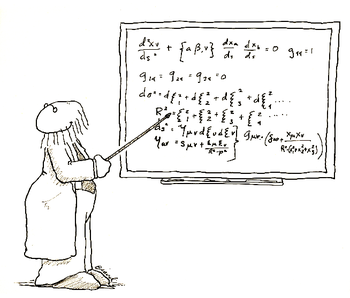
Once again we see a representative of the elite coterie of theologians pouring scorn on the ability of mere lay people to make any valid assessment of their highly learned and scholarly arguments.
Carrier suggests that laypeople can and should evaluate the arguments of experts, even with respect to the consensus. That seems to me strikingly odd – if laypeople who do not have the extensive knowledge professional scholars do can normally (and not just in exceptional rare cases) evaluate matters in that domain, then surely that implies that one doesn’t need the extensive knowledge of data experts have in order to draw conclusions. But anyone who has studied a subject even as an undergraduate, and has had what they thought was a brilliant insight, only to discover through grad school that their idea was neither new nor brilliant, will probably protest that Carrier is wrong. (Professor James McGrath, Galileo was Wrong, 8th May 2014, my emphasis)
Of course the first thing one notes here is the mischievous framing of the question. Our theologian friend makes it sound as if what is open to challenge are the complex details of “data”, the facts, let’s say the nuances of Greek, Syriac and Aramaic texts, and so forth, by only partially informed amateurs and whether they should be so flippant on a “normal” every-day basis.
Of course that is not what the issue is at all. In matters of historical inquiry there is no argument or data that is so complex that it cannot be explained simply and understood by the average anybody. History is not advanced mathematics or quantum physics. If theologians have good arguments for the historical existence of Jesus then there is no reason they cannot be presented in a way that is comprehensible to all.
To this extent the Professor is being a little misleading when he implies that the views of theologians (and let’s add historians here, too) and scientists deserve equally unquestioning acceptance by the public. A historian can explain to me clearly in a way I can understand the reasons, the evidence, for his or her claims and I can understand the arguments of other historians who disagree. I cannot do the same with scholars who debate questions in mathematics or complex physics and the origins of the universe. I have forgotten too much of the science I once learned to pretend I can even fully understand or evaluate the research of climate scientists.
Unfortunately McGrath’s post fails to grasp this basic point. In his failure to grasp the fact that there really is a vast gulf between the humanities/social sciences on the one hand and the hard sciences/mathematics on the other when it comes to the potential for public understanding, he probably fails to realize how patronizing his stance really is.
That is, his argument takes a turn that sets up an ignorant elitist gulf between academics generally and a riff-raff public.
(Don’t get me wrong. I’m not saying that academics are not superior to others at some things. There would be real problems if they weren’t. Universities can truly be said to contain more of the most intelligent members of society than other institutions. But anyone who works among academics, whether as an academic or support staff, also knows that a few of them truly are the most arrogant, insufferable snobs. I am sure Professor McGrath is not one of those, but he does unfortunately express a snobbish — certainly a breathtakingly thoughtless — argument in his post.)
Before we turn our attention to the elephant in the room, maybe I could use my own way of evaluating scholarly arguments to make the point that a lay amateur really can make valid evaluations of scholarly arguments. If Professor McGrath or anyone else can find serious error and a propensity for misjudgment in how I go about assessing scholarly claims I would love to be told. I have been seriously wrong about things before so I have tried to hone my methods of learning to try to be less wrong now.
Continue reading “Can a lay person reasonably evaluate a scholarly argument?”
